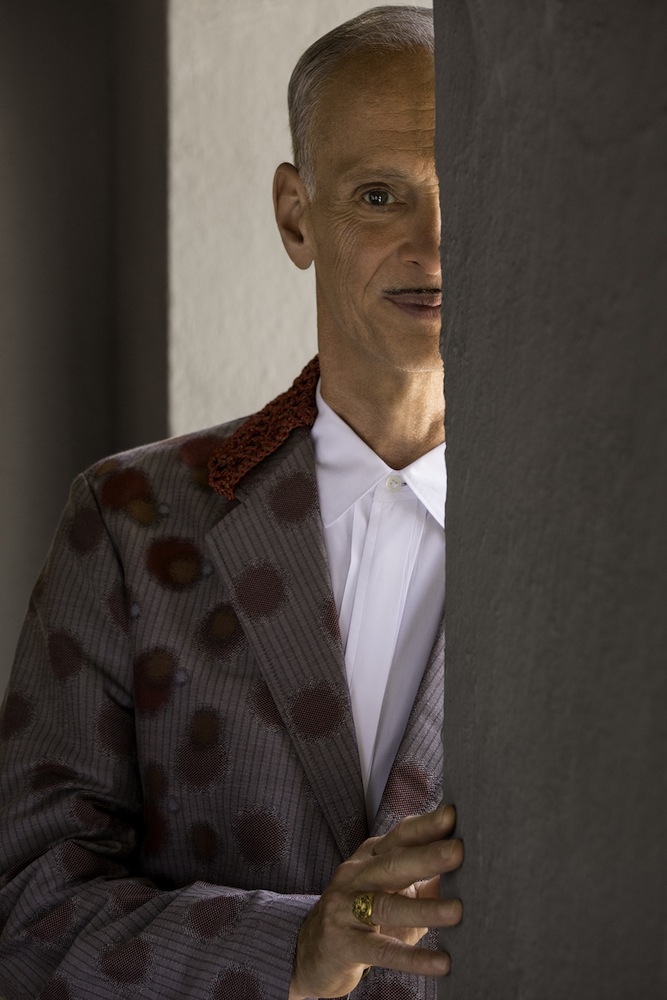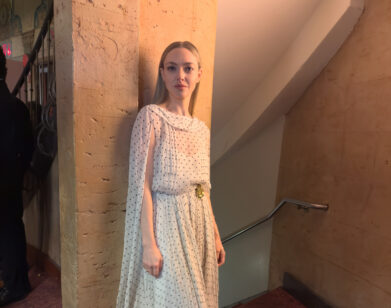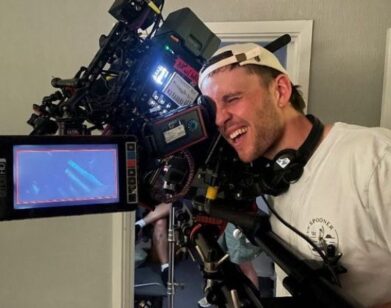John Waters Takes It All
“The filthiest people alive! Their loves, their hates and their unquenchable thirst for notoriety!” “An exercise in poor taste.” Such were the taglines of filmmaker John Waters’ 1972 midnight movie romp Pink Flamingos. Some people might argue about this, but one of the most glamorous, perverse, and subversively satisfying scenes in American movies is in Flamingos. Its star, Divine, dressed to the nines in drag, struts and wiggles through downtown Baltimore to Little Richard’s “The Girl Can’t Help It.” It’s in part an homage to the sequence in the film of the same name starring ’50s sex bomb Jayne Mansfield, but in a sick twist, culminates in Divine grabbing a length of toilet paper out of her handbag, and gleefully taking a shit.
William S. Burroughs christened him the “Pope of Trash,” but Baltimore native Waters has become a poet laureate of the underground, and exacting satirist of American culture. “There are two kinds of people, my kind of people and assholes,” says Connie Marble, Mink Stole’s character in Flamingos, and there are definitely Waters people—those who are not just in on the joke, but those who revel in it. Stole, one of Waters’ early collaborators, along with Divine, David Lochary, Edith Massey, Mary Vivian Pierce, and Cookie Mueller, who made up a theater troupe of sorts dubbed “The Dreamlanders,” drove home Water’s fully-formed brand of ferociously operatic, all-inclusive high-camp absurdity, sexual perversion, sick bodily humor, and screeching all-out war against polite culture and general convention.
Starting tomorrow September 5th, Waters will be the subject of his first complete U.S. retrospective at the Film Society of Lincoln Center, 50 Years of John Waters: How Much Can You Take? The program spans Waters’ career—from his early films Hag in a Black Leather Jacket (1964), Eat Your Makeup (1968), and Mondo Trasho (1969), to midnight movie staples Pink Flamingos (1972) and Female Trouble (1974), and later-career Hollywood genre send-ups like Polyester (1981), Cry-Baby (1990), and Serial Mom (1994)—and also includes a series of and a series of films selected by Waters (“Movies I’m Jealous I Didn’t Make”). It puts the cultural polymath on display, and he couldn’t be happier. “I always said, ‘I make exploitation films for art theaters,’ and I still do. I’m finally at Lincoln Center!” Waters says. “I’m filthy and respectable! It’s the ultimate irony.”
We recently called up Waters, who was in San Francisco after his usual summer sojourn in Provincetown.
COLLEEN KELSEY: Hi John! I’m excited to talk about this retrospective at Lincoln Center because when I first saw the announcement, two things came to mind: one, I couldn’t believe that there hadn’t already been a full U.S. retrospective of your movies. Secondly, in the first couple lines of the announcement, it calls you a “national treasure,” which I happen to completely agree with.
JOHN WATERS: Good things come to those who wait. It’s been 50 years since I was on the roof of my parents’ house shooting Hag in a Black Leather Jacket when I didn’t even know there was such a thing as editing. I thought you just shot the film and showed it. That’s exactly what I did. I’m not that different 50 years later. I think I technically learned some things, hopefully. But I go to the movies for characters and story and a berserk vision. Today, you see a kid making a film on a cell phone. He doesn’t know what he’s doing either. But it comes out kind of good. My early movies are completely ephemeral, but in the same way, they have part of my youth. I was so young. I lived in my parents’ house when I made Hag and Eat Your Makeup. I never thought they’d be showing it at Lincoln Center, [laughs] which I think is hilarious.
KELSEY: Well, retrospectives are the kinds of places you can luck out and see all those nuggets you wouldn’t usually.
WATERS: You definitely can. You can see, like in Hag in a Black Leather Jacket, a Ku Klux Klan [member] performing a wedding of a white woman and a black guy on the roof of my parents’ house. We used my mother’s wedding dress without asking her, and she was mad. But when I look back, my parents were so supportive for allowing us to do this. I mean, in Eat Your Makeup, there’s a scene where we do the Kennedy assassination, Divine crawling up the trunk of a car in a pink pillbox hat and suit and everything. That was on my parents’ street. I was really amazed to find out, especially since this is Interview, that Warhol made a movie the exact same time we were making Eat Your Makeup called Since (1966), where they shot the Kennedy assassination. It was never even shown until a couple years ago. I never even knew about it or heard about it. They had a couch as the car. We had an even bigger production than Warhol. That was amazing! At least I rented a limo. I loved that idea that Mary Woronov, who’s one of my favorite Warhol stars, played JFK. I loved the idea that we were completely, without knowing it, were doing the exact same thing at same time.
KELSEY: What was one of the first pieces of subversive or transgressive filmmaking you saw that really shook you up?
WATERS: George and Mike Kuchar’s movies, definitely, I think even more than Andy’s, because they had that lurid color and overacting, and the soundtrack stolen from Hollywood movies. They were melodramatic and they were hilarious. They were starring their friends just like I starred my friends. The first Warhol movie I ever saw probably was Kiss (1963) or Eat (1963) or Empire (1964), but I guess Chelsea Girls (1966) was the one that I blatantly did copy, in Roman Candles (1966). It was hard to be a debauched bohemian in Lutherville, Maryland, which is where we filmed that movie. I think Chelsea Girls is a complete masterpiece and I think Andy’s films are equally as good as the art. I think one day they will be considered equal. They aren’t yet. They will be.
KELSEY: Considering the content of your earlier films, and to your attraction to subjects dubbed taboo or forbidden, now, and with the Internet, do you think that there are still taboo subjects?
WATERS: There are, but if you purposefully look to shock people, it isn’t funny. That’s what 50 million dollar Hollywood comedies do today; try to be shocking and dirty. They aren’t really. It isn’t enough to shock. It’s easy to shock. Real surprise is what I’m after. Those early movies, we had drugs, which you weren’t supposed to show. You weren’t supposed to shoot up. We would make fun of hippies. I think that we were punk before there was punk. We didn’t know there was such a thing. Even Divine’s image from Female Trouble was on early punk rock t-shirts, and they didn’t even know who Divine was or what that was from, they just appropriated the image.
Those early movies starred Maelcum Soul. She looked exactly like how she looks in Roman Candles and Eat Your Makeup. She was a beatnik goddess, she was in Life magazine but she came back to Baltimore. We were all scared of her. We lived in awe of Maelcum. I mean, Divine was scared of her. When I see Roman Candles today, I miss Maelcum. I miss everybody. You go through the movies and you see them. God, we were so young. Everybody should wish they had home movies of themselves, acting out their lunacy on LSD. [laughs] We were never on drugs while we made the movie, but I certainly was on marijuana or LSD when I thought them up. The audience, I would say, for Pink Flamingos, Female Trouble, Desperate Living, was on marijuana when they saw it. When we first showed those really early underground movies, Hag in a Black Leather Jacket was shown once in a beatnik coffee house to really no notice, we passed the hat and got nothing, or $2 or something. Roman Candles was shown in a church, and so was Eat Your Makeup, so was Mondo Trasho, and so was Multiple Maniacs (1970). It’s hard to imagine that churches showed these movies but a few in the ’60s, like St. Mark’s Church, or on the Bowery, they always were left-wing. The Black Panthers met there. I remember Multiple Maniacs, which has the rosary job, I think probably the rudest scene I ever shot, that was filmed in a church. The priest was in the other room debating the Black Panthers while we were shooting the scene. He had no idea, and he came to the premiere and I felt sad for him. He was so horrified.
KELSEY: One of the original trailers for Pink Flamingos has no footage of the film at all—just the audience’s reactions leaving the theater.
WATERS: There was never a trailer with footage I don’t think. It was Bob Shaye, the head [of New Line Cinema]’s, idea to never show it, because then you’re giving away everything, but to just have the audience’s kind of shocked reaction. That trailer definitely worked at the time.
KELSEY: In making these movies and in making divisive work in general, how important do you think it is to be a reactionary to the status quo?
WATERS: I built a career on negative reviews. I didn’t get a good review ever until Fran Lebowitz gave me a good review in Interview. That was the first good review I got in 10 years. There was a cultural war going on, the ’60s was going on. All the film critics were square. They hated these movies, so they would write out these reviews that we would put in the ads. You could never have that happen today. Critics are way too hip, except for maybe Rex Reed—he still falls for the bait. At the same time, it’s hard to make that work anymore, because there isn’t a war going on. You make a transgressive movie and it’s a hit in commercial art theaters. It could have never been a commercial hit then. I think Chelsea Girls was one of the first ones that kind of was. An underground hit didn’t make any money and it cost a dollar to get in. You have to remember the police used to raid and arrest the audience for seeing Scorpio Rising (1964), or Jack Smith movies. Wouldn’t that be exciting today, if you see went to the movie and everyone at the IFC was arrested in a paddy wagon and taken away?
KELSEY: But is it not more gratifying as the producer of something to have people “get it” and actually respond to it in a welcoming way?
WATERS: I think in a way it’s much nicer, nicer than having to go to jail and get out with the projectionist. They always busted the projectionist as if he had anything to do with the booking of the film. It’s the times. It won’t happen today. It’s a thing of the past. It’s never going to go back to any of the things, it’s never going to go back to film. I can’t complain about anything. It’s like saying, “I don’t like talkies.” Time marches on and I don’t care how people watch my movies as long as they see them. I don’t care if they’re on their phone. Believe me, if you ever want to watch Roman Candles it would look a lot better on your phone than it would on a movie screen. [laughs] The smaller the better. [laughs]
KELSEY: Who do you think is pushing buttons now?
WATERS: Certainly Harmony Korine, certainly Gaspar Noé, certainly Todd Solondz. There’s millions of them. I always pick those kinds of movies, they’re usually French, they’re usually feel-bad movies. I like hard movies; I like ones that are basically the opposite of a date movie.
KELSEY: The other day I was thinking about sort of the similarities between “art movies” and lowbrow movies like kitschy sexploitation films. I think they share certain qualities, whether they’re hyper-stylized or overly emotive or just very visual. And I think the extremes are something that’s really interesting to see coalesce in movies. I know you’ve been influenced from everyone from Bergman to the complete opposite.
WATERS: That’s the thing. I was as equally influenced by Bergman as I was [low-budget sexploitation filmmaker] Russ Meyer or [“splatter” horror filmmaker] Herschell Gordon Lewis. At the same time I was seeing [Spanish surrealist auteur Luis] Buñuel, so I think I put both those things together.
KELSEY: When do you get your best ideas?
WATERS: Always in the morning. I get dumber as the day goes along. Every second of the day that goes along, I get stupider. I’m the smartest at 8 A.M. I wake up at 6, drink three cups of Awake Tazo Tea and read five newspapers. I have to think up something every day, Monday to Friday. This morning I was working on an art show I’m having at Marianne Boesky in January. I call it “thimking.” They used to have a thing from IBM, a sign that said “THINK,” in every office in the ‘50s. And then Mad put out one that said “THIMK,” and so that’s what I have to do everyday, thimk.
KELSEY: Going back to the ideas of extremes, is there anywhere where you would draw the line or wouldn’t cross, something that’s genuinely bad and not satire or tongue in cheek?
WATERS: Well to me, racist jokes are not funny. I am politically correct, in a weird way. I like to push the boundaries that are politically correct. I always think I’m on the right side, and isn’t that what it’s about?
KELSEY: There’s definitely ways to skewer the status quo not by being offensive but by being enlightening.
WATERS: You can have fun. I think the best article was in The New Yorker recently, the article about radical feminists being against transgender women. I found that the most fascinating article and I absolutely loved it. I love battles within the gay community or feminist community. I love radical theorists. But at the same time, I don’t agree with them a lot [laughs] but I love their theories. I love how they intellectualize rage, and this inner battle that such a tiny percent of people really care about. I find that the most interesting.
KELSEY: And after finishing the cross-country hitchhiking trip that you wrote about in [Waters’ recently released book] Carsick, what do you think you learned about what America is like right now?
WATERS: I don’t know if I learned anything. It reinforced everything that I believe. I am an optimist. I believe in the goodness of people. The people in Middle America were as open-minded as anybody I would find in a New York underground movie screening or a San Francisco art festival. I think they’re not as predictable. You can’t really tell what people are going to believe in exactly. The people that pick up hitchhikers, now that is a special breed of people, no matter what their politics or sexual orientation, no matter what they are. People that pick up hitchhikers I believe are basically good people that believe in other people and understand problems and don’t judge people. That’s always the kind of person I’m looking for.
KELSEY: I also wanted to talk a little bit about your audience. It seems to skew pretty young; I know you perform at colleges a lot.
WATERS: I think that young people understand me perfectly. I think that’s the luckiest thing about my career, that I get older and they get younger, and it didn’t stop with my generation. I never thought I had more fun when I was young than kids are having today. I think they have just as much fun. It’s a different way to have fun. Shutting down governments on your computer is just as much as fun as going to a riot at Yale. [laughs] I understand it, I don’t know to do it and I’m not going to do it. But at the same time, I don’t really have a lot to gripe about. I have been understood. So I think that nobody gets mad at me anymore, no matter what I say, because I don’t think I’m mean. I am interested in what’s next. It delights me to find something that kids are doing that surprises me that seems new. That’s the best feeling you can have.
What I’ve been doing recently, I’ve been rewriting This Filthy World because I’m doing it a lot. Then I have 17 Christmas shows in December. I’m rewriting that. I’m going to start another book that I never talk about until it’s done. If [Waters’ long gestating film] Fruitcake gets made, I’ll be happy to do it. I have meetings. I keep on having ideas and developments. Some happen and some don’t, but I still always have a way of telling a story. I’m booked for the next year already. Things are going great in every part of my life except movies. That’s okay. I’ve got a lot of other parts of my life. I’ve made 15 movies. You can see any one of my movies and it says the same thing. You’ve seen the humor and the embracing I’m trying to do of a certain attitude in life. I’m against separatism. I’m for everyone to gather. I’m for everyone lunatic to hang out together. I want to hear somebody else’s bad night, not just mine.
50 YEARS OF JOHN WATERS; HOW MUCH CAN YOU TAKE? STARTS FRIDAY, SEPTEMBER 5TH AT FILM SOCIETY OF LINCOLN CENTER







